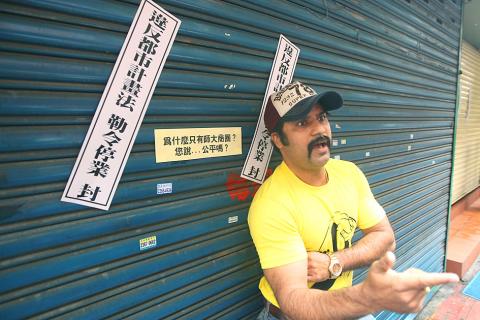Restaurants and eateries on “exotic gourmet street” at Shida Night Market in Taipei yesterday shut their doors during the lunch hour to protest the Taipei City Government’s recent crackdown on illegal businesses in the area.
After hanging protest signs that read: “Why target only Shida commercial area? Is it fair?” on their doors, about 30 restaurants on Pucheng Street and Longquan Street delayed opening until late yesterday afternoon.
The move, restaurant owners said, was aimed at raising public awareness of local business’ contributions to the area.

Photo: CNA
“We are hoping that by closing our doors during the lunch hour, local residents and students will understand how inconvenient it is without places for them to go for lunch,” an employee at an Indian restaurant said.
Vendors’ self-help association spokesman Ker Yu-you (柯裕佑) said local business owners would continue their efforts in an attempt to ensure the survival of their businesses and he urged the city government not to make its top tourist attraction disappear.
The local residents’ self-help association, on the other hand, insisted that the city government should not allow illegal businesses to stay in the area, noting the air and noise pollution, as well as the public hazard caused by some shops and restaurants.
“Local residents are the real victims here. Illegal businesses should close their doors forever and give us back a clean and safe living environment,” association director Liu Cheng-wei (劉振偉) said.
Taipei City Government spokesman Chang Chi-chiang (張其強) said the city government’s goal of maintaining a safe and quiet environment for residents remained the same.
“It’s not our goal to eliminate the night market, we only target businesses that have caused serious public safety concerns and that have violated the regulations,” he said.
Disputes over the night market began after Taipei Mayor Hau Lung-bin (郝龍斌) announced in November last year that expansion of the market would not be allowed following a growing number of complaints from residents about the trash and noise vendors and customers caused.
In addition to noise and air pollution, some local vendors have also violated regulations as their locations are classified as a residential zone. According to land-use regulations, roads less than 6m wide in residential zones cannot be used for commercial purposes.
Taipei City’s Construction Regulation Office said it has issued notices to 91 shops in the area that have violated regulations. In addition to Shida, a coffee shop in Yongkang commercial area (永康商圈), another popular destination filled with small shops and restaurants, also received notice from the city government as it is located in an alley less than 6m wide.
Chang dismissed concerns that the city government is targeting specific commercial districts, saying the coffee shop in Yongkang is an individual case, because local residents had filed complaints against the shop.

DAREDEVIL: Honnold said it had always been a dream of his to climb Taipei 101, while a Netflix producer said the skyscraper was ‘a real icon of this country’ US climber Alex Honnold yesterday took on Taiwan’s tallest building, becoming the first person to scale Taipei 101 without a rope, harness or safety net. Hundreds of spectators gathered at the base of the 101-story skyscraper to watch Honnold, 40, embark on his daredevil feat, which was also broadcast live on Netflix. Dressed in a red T-shirt and yellow custom-made climbing shoes, Honnold swiftly moved up the southeast face of the glass and steel building. At one point, he stepped onto a platform midway up to wave down at fans and onlookers who were taking photos. People watching from inside

A Vietnamese migrant worker yesterday won NT$12 million (US$379,627) on a Lunar New Year scratch card in Kaohsiung as part of Taiwan Lottery Co’s (台灣彩券) “NT$12 Million Grand Fortune” (1200萬大吉利) game. The man was the first top-prize winner of the new game launched on Jan. 6 to mark the Lunar New Year. Three Vietnamese migrant workers visited a Taiwan Lottery shop on Xinyue Street in Kaohsiung’s Gangshan District (崗山), a store representative said. The player bought multiple tickets and, after winning nothing, held the final lottery ticket in one hand and rubbed the store’s statue of the Maitreya Buddha’s belly with the other,

‘COMMITTED TO DETERRENCE’: Washington would stand by its allies, but it can only help as much as countries help themselves, Raymond Greene said The US is committed to deterrence in the first island chain, but it should not bear the burden alone, as “freedom is not free,” American Institute in Taiwan Director Raymond Greene said in a speech at the Institute for National Defense and Security Research’s “Strengthening Resilience: Defense as the Engine of Development” seminar in Taipei yesterday. In the speech, titled “Investing Together and a Secure and Prosperous Future,” Greene highlighted the contributions of US President Donald Trump’s administration to Taiwan’s defense efforts, including the establishment of supply chains for drones and autonomous systems, offers of security assistance and the expansion of

STREAMLINED: The dedicated funding would allow the US to transfer equipment to Taiwan when needed and order upgraded replacements for stockpiles, a source said The US House of Representatives on Thursday passed a defense appropriations bill totaling US$838.7 billion, of which US$1 billion is to be allocated to reinforcing security cooperation with Taiwan and US$150 million to replace defense articles provided to the nation. These are part of the Consolidated Appropriation Act, which the US House yesterday passed with 341 votes in favor and 88 against. The act must be passed by the US Senate before Friday next week to avoid another government shutdown. The US House Committee on Appropriations on Monday unveiled the act, saying that it allocates US$1 billion for the Taiwan Security Cooperation Initiative